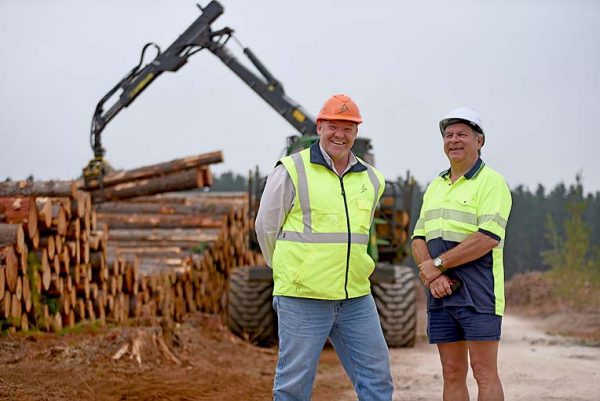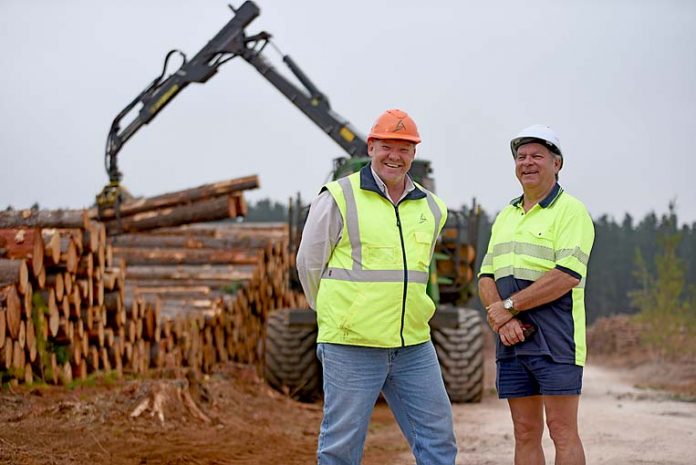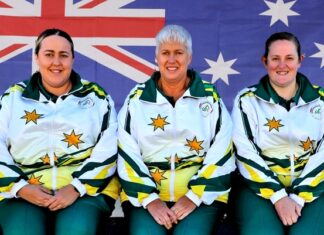
VETERAN logger Bryan Wright quietly reminisces in the centre of a clear-felled plantation about his enduring career in the forestry sector.
Standing in the same plantation block at Kongorong that was felled with a chainsaw as a 21 year old, Mr Wright, 64, says time flies when you are having fun.
The Wright family – operating as K&G Wright – is considered an institution in the forestry sector given they have built the family business from humble beginnings.
While the family is not one to seek the spotlight, The Border Watch was given a rare insight into its thriving and state-of-the-art logging operations.
“I was only thinking the other day I wish it was my first day back again,” said Bryan, as the humming of a harvester fells trees in the distance.
Explaining his parents Keith and Gwen Wright founded the company in the early 1950s, he revealed the operation now spanned three generations.
When Keith and Gwen retired, their sons Leslie and Bryan Wright took over the running of the company.
As the scent of diesel and freshly cut pines waft across the sprawling plantation block, Bryan explains how the harvesting industry has evolved.
“My parents started with old Blitz trucks left over from the war – everyone in the industry was a family company back then,” Bryan recalled.
At that time, there were up to eight family businesses working in the forests with “one or two trucks” and cutting by hand with bow saws and axes.
While the industry decades ago was back-breaking and laborious work, he revealed harvesting machines were now fitted with cutting edge technology and driver comfort.
The harvesting machines are now equipped with “optimisers”, which means they cut specific diameters and length.
“All you have to do now is to watch for defects,” Bryan added.
Sporting a broad smile and a deep passion for the sector, there is no doubt the logging industry runs freely through Bryan’s veins.
“I love being out in the plantations – it is beautiful out here. I love the banter that goes on among the company’s 20 employees,” he said.
While the industry has had its “ups and downs”, Bryan revealed the company had been able to ride out any turbulence given it was a small family owned company.
“I only remember once that was really bad and that was around 10 years ago, but other than that, we have been consistent.”
Mr Wright said he was proud of the company’s long-standing involvement with Green Triangle Forest Products (GTFP) given 90pc of its log flowed into the domestic market.
“I like the fact the company does not rely on export, they rely on mill log – all of this log you can see goes to the domestic market,” he added.
“The only export material you will see here is woodfibre that cannot be processed here.”
He said the domestic market not only underpinned his business, but also jobs across the region’s processing sector.
Looking ahead, Bryan said the industry had a bright future if the resource continued to be cut sustainably and replanted.
Meanwhile, Bryan’s son Nathan – who is a diesel mechanic and tasked with keeping the machines operating – said he also enjoyed being part of the logging sector.
“It is great to be part of the family business. We have children, so we want to keep it going for as long as we can,” Nathan said.
Explaining he was previously employed in the mining sector, he said working in “red dirt” was not enjoyable.
“But out here in the plantations, it is just a nice place to be – I love it.”
His brother Mitch – who started as a forwarder operator in the business – now has the position of supervisor.
“I just love the outdoors – that’s the main reason why people are in the pine industry. I also like big machines,” Mitch said.
“It can be long hours, but people are generally happy. It is a good and sustainable industry and a renewable sector.
Green Triangle Forest Products harvesting manager Mark Wells said the Wright family had been valuable partners for many decades.
“There is a lot of stability in their business and they are a very ethical family,” Mr Wells said at the Kongorong felling site.
“That’s the values of GTFP – to be respectful and ethical. That’s why the relationship works so well.”
While the company had a number of contractors, he said the Wright family was the only one that undertook clear-felling.
Mr Wells reiterated GTFP’s silvicultural regime was centred on supplying the domestic market.
“It is important this source is put back into the local economy. That is what grows the industry and makes it stable,” he said.
“We clear-fell trees anywhere between 28 and 35 years of age. Sustainability is a key aspect of our operations.”
Mr Wells – who described plantation timber as the “ultimate” renewable – said GTFP also had a “zero burn” policy and tried to utilise all the woodfibre possible, which was an important environmental outcome.
“If you burn large areas, that impacts on air quality.”
Mr Wells also suggested there needed to be a greater focus on planting more trees.
“Not only is this good for the environment, when you have strong primary industries like forestry and agriculture it creates a lot of jobs.”
He said the forest sector was evolving with new age products coming onto the market, an example being engineered timber products used in multi-storey buildings. The amount of energy used to create concrete and steel is not sustainable in the long term.
“But with wood, if you look after it and you do not let it burn and take care of it, it is going to be there for us well into the future.”








